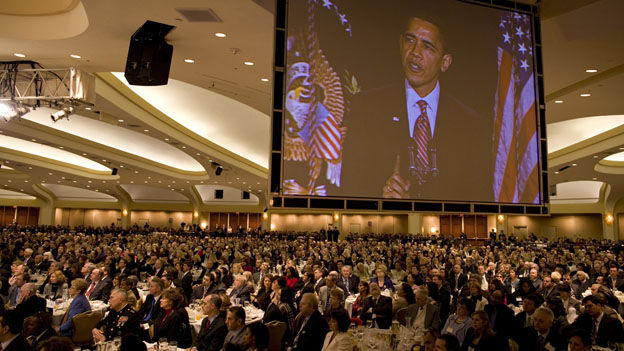Glawe: Christianity shares a once violent history
President Obama’s statements at the National Prayer Breakfast were truthful, no matter how dissenters feel about it. However, columnist Glawe believes the President could have been even more specific about Christian violence in his speech. Courtesy of the Whitehouse
February 20, 2015
As a secular country, establishing such needless obligations, indeed necessities, such as a “National Day of Prayer” — an insult to Jefferson’s Virginia Statute for Religious Freedom — is a dangerously common procedure. Now, we secularists must suffer yet another transgression in the form of piffle-filled anger against President Obama’s remarks at the recent “Prayer Breakfast.”
Obama’s mention of the Crusades and the Inquisition, a healthy refresher of Christianity’s exploits abroad, has caused a stir among the votaries of that belief. One headline, from an admittedly dubious source, read, “BREAKING: OBAMA, Christians Are Just Like Islamic Radicals.” Legions of Christian apologetics and revisionists alike have endorsed similar propagandizing, a practiced routine of dodging historical fact.
The grievances of all secularists are twofold against the storm of Christian whimpering. First, we live in a secular country and President Obama shouldn’t be obligated to endorse Christianity, nor does he have to perpetuate mistruths in its name. Second, the president and his speechwriters drew up an interesting and valuable contrast, but we can come up with an updated comparison.
In 1802, Thomas Jefferson wrote a letter to the Danbury Baptist Association in response to concern about the persecution of their religious freedoms by the Congregationalists of Connecticut.
Jefferson’s letter itself stands as a profound exemplar of the necessity in separating church and state: “I contemplate with sovereign reverence that act of the whole American people which declared that their legislature would ‘make no law respecting an establishment of religion, or prohibiting the free exercise thereof.” The term “wall of separation,” which is so often quoted by secularists like myself, made its first appearance here.
No articulation can fully and adequately express the depth of those words. They stand on their own, representing a culmination, as it was hoped, in the ongoing struggle to prevent religious endorsement from government officialdom. Forged upon this struggle is the First Amendment to the United States Constitution, which afforded the Danbury Baptists religious freedom against the other religions.
Yet today, we see the perpetration of this ideal everywhere. Christianity has always been given a free pass, allowing for the leakage of peculiar beliefs into the authorities of public matters. When Christians are up in arms — relievedly not physically in arms — about a president’s reference to the sinister acts of their forebears, we secularists have to be insulted everyday by the secured existence of a “Prayer Breakfast” in the first place.
The Inquisition sought to uncover heretics within the religion, something familiar to a text at once vaguely and not vaguely calling for war against the “nonbelievers” or “infidels.” The term “Crusades” in its usages and context may well be replaced by Jihad, at least to anyone looking from the outside in.
But President Obama’s speechwriters could have referenced much later and more recent violence against the innocents. One may readily call to mind two Christian factions, Catholics and Protestants, murdering each other in armed hostility. Even more vivid is the thought of Christians mass murdering Muslim populations of the Balkans in the 1990s.
What falls more at home, and to President Obama and his African-American roots is the moral justification of slavery in Christian texts that allowed southern slave owners to perpetuate this evil.
The most disgusting and disgraceful passage of the Bible seems to cast its endorsement, “All who are under the yoke of slavery should consider their masters worthy of full respect, so that God’s name and our teaching may not be slandered. Those who have believing masters should not show them disrespect just because they are fellow believers. Instead, they should serve them even better because their masters are dear to them as fellow believers and are devoted to the welfare of their slaves” (1 Timothy 6:1-2).
We cannot avoid accepting the shadow of disgustingly immoral acts littering history. They are presented before us with nuance, yes, but responded always with a uniform moral interpretation. The best we can do is reconcile ourselves and strive to improve upon the life we were given. At one time, Christianity, given the power of majority and authority, was just as violent as the Muslim extremists now tainting our world. Each act of violence should be addressed separately, but always with the firm principles set forth by enlightenment.
The general theme is that we humans are fallible, always muddling up morality and eventually coming to a resolution. We should be embracing the Muslim population, which seeks to overthrow the extremists and arrive at that same resolution. None of this requires the subscription to revisionism, which is itself a tyranny of the mind.







